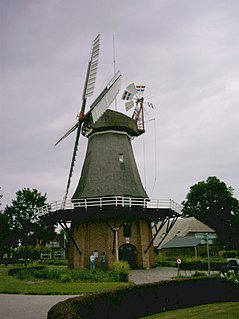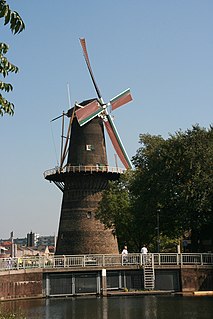
Kinderdijk is a village in the municipality of Molenwaard, in the province of South Holland, Netherlands. It is located about 15 km east of Rotterdam.

The post mill is the earliest type of European windmill. Its defining feature is that the whole body of the mill that houses the machinery is mounted on a single vertical post, around which it can be turned to bring the sails into the wind.

De Adriaan is a windmill in the Netherlands that burnt down in 1932 and was rebuilt in 2002. The original windmill dates from 1779 and the mill has been a distinctive part of the skyline of Haarlem for centuries.

A tower mill is a type of vertical windmill consisting of a brick or stone tower, on which sits a wooden 'cap' or roof, which can rotate to bring the sails into the wind.

Zaanse Schans is a neighbourhood of Zaandam, near Zaandijk, Netherlands. It is best known for its collection of well-preserved historic windmills and houses. From 1961 to 1974 old buildings from all over the Zaanstreek were relocated using lowboy trailers to the area. The Zaans Museum, established in 1994 near the first Zaanse Schans windmill, is located south of the neighbourhood.
Debden Windmill is a grade II listed Tower mill at Debden, Essex, England which has been converted to residential use.

Lille Mølle is a historic house museum in the Christianshavn neighbourhood of Copenhagen, Denmark. It was the last windmill on the old ramparts of Christianshavn. It is a Dutch smock mill erected in 1783 on one of the bastions, replacing a post mill built in 1669. It was turned into a private home in 1916.

De Sterrenberg is a smock mill in Nijeveen, Drenthe the Netherlands. It was built in 1977. The mill is listed as a Rijksmonument, number 30957.

De Noord is a windmill located on the Noordvest 38 in Schiedam, Netherlands. It is the tallest windmill in the world with a roof height of 33.3 metres. Its wing span is 26.6 metres. The mill is one of the five remaining windmills in Schiedam, and is a national monument since 29 May 1969. Today De Noord houses a restaurant.

The Terpensmole is a drainage mill in IJlst, Friesland, Netherlands. It was moved from its earlier location in Sneek in 2011 where it was known as the Himmole. The mill is listed as a Rijksmonument, number 22914. It is fully functional and can be used to help drain the adjacent polder.

Spinnenkop Wedderveer is a wind powered sawmill in the village of Wedderveer, Groningen, Netherlands. It is a hollow post windmill of the type called "spinnenkop" by the Dutch built on top of a brick shed. The mill is listed as a Rijksmonument, number 388083 and is in working order.

The spinnenkop of the Netherlands Open Air Museum in Arnhem is a small drainage mill originally located near Gorredijk, Friesland, Netherlands. It is a hollow post windmill that has been restored to working order.

De Zwaan is a tower mill in Lienden, the Netherlands, which is in working order. The mill was built in 1644 and is listed as a Rijksmonument, number 25834.

The Oude molen does mean ''Old Mill'' in Dutch. Is a windmill in Kruiningen in the Dutch province of Zeeland.

The Zuidpoldermolen is a windmill in Edam, dated between 1626-35 and was used to grind grain and drain a polder: low land that has been reclaimed from the sea and diked.

Op de Vrouweheide is a windmill located on the Vrouwenheide just south of Ubachsberg, Voerendaal, in the Dutch province of Limburg. Build in 1858 as a tower mill, on an artificial hill, the windmill functioned as gristmill. The mill is a national monument since 17 January 1967.

De Akkermolen is a 17th-century windmill in Zundert, Netherlands. Built around 1605 to replace an earlier windmill, it was used as a gristmill until it was severely damaged in 1950. The mill was bought by the local government and restored in 1961, and it was listed as a national heritage site in 1974.

De Windhond is a windmill in the city of Woerden, Netherlands. The mill was built in 1755 on an artificial hill of 9.3 metres (31 ft) in height that was part of the defensive enclosure (stadswal) of the ancient city. The mill itself is 5.7 metres (19 ft) high. The windmill sail spans 25.2 metres (83 ft).

The smock mill at the Netherlands Open Air Museum, Arnhem, Gelderland, Netherlands was originally built at Noordlaren, Groningen, Netherlands in 1862. It was dismantled in 1953 and re-erected at the museum in 1960. The mill has been restored to working order.

De Hoop is a tower mill in Arnhem, Gelderland, Netherlands which was built in 1846 and is in working order. The mill is listed as a Rijksmonument.






















